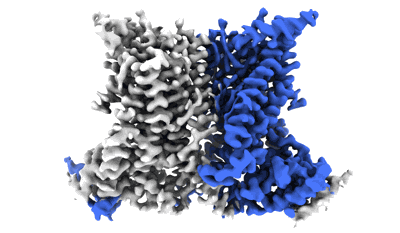EMD-41477
nhTMEM16 lipid scramblase in lipid nanodiscs with MSP1E3 scaffold protein in the absence of Ca2+
EMD-41477
Single-particle2.93 Å
 Deposition: 04/08/2023
Deposition: 04/08/2023Map released: 08/05/2024
Last modified: 30/10/2024
Sample Organism:
Fusarium vanettenii 77-13-4
Sample: Dimeric Lipid scramblase nhTMEM16
Fitted models: 8tpm (Avg. Q-score: 0.499)
Deposition Authors: Feng Z ,
Accardi A
,
Accardi A 
Sample: Dimeric Lipid scramblase nhTMEM16
Fitted models: 8tpm (Avg. Q-score: 0.499)
Deposition Authors: Feng Z
 ,
Accardi A
,
Accardi A 
Structural basis of closed groove scrambling by a TMEM16 protein.
Abstract:
Activation of Ca2+-dependent TMEM16 scramblases induces phosphatidylserine externalization, a key step in multiple signaling processes. Current models suggest that the TMEM16s scramble lipids by deforming the membrane near a hydrophilic groove and that Ca2+ dependence arises from the different association of lipids with an open or closed groove. However, the molecular rearrangements underlying groove opening and how lipids reorganize outside the closed groove remain unknown. Here we directly visualize how lipids associate at the closed groove of Ca2+-bound fungal nhTMEM16 in nanodiscs using cryo-EM. Functional experiments pinpoint lipid-protein interaction sites critical for closed groove scrambling. Structural and functional analyses suggest groove opening entails the sequential appearance of two π-helical turns in the groove-lining TM6 helix and identify critical rearrangements. Finally, we show that the choice of scaffold protein and lipids affects the conformations of nhTMEM16 and their distribution, highlighting a key role of these factors in cryo-EM structure determination.
Activation of Ca2+-dependent TMEM16 scramblases induces phosphatidylserine externalization, a key step in multiple signaling processes. Current models suggest that the TMEM16s scramble lipids by deforming the membrane near a hydrophilic groove and that Ca2+ dependence arises from the different association of lipids with an open or closed groove. However, the molecular rearrangements underlying groove opening and how lipids reorganize outside the closed groove remain unknown. Here we directly visualize how lipids associate at the closed groove of Ca2+-bound fungal nhTMEM16 in nanodiscs using cryo-EM. Functional experiments pinpoint lipid-protein interaction sites critical for closed groove scrambling. Structural and functional analyses suggest groove opening entails the sequential appearance of two π-helical turns in the groove-lining TM6 helix and identify critical rearrangements. Finally, we show that the choice of scaffold protein and lipids affects the conformations of nhTMEM16 and their distribution, highlighting a key role of these factors in cryo-EM structure determination.
